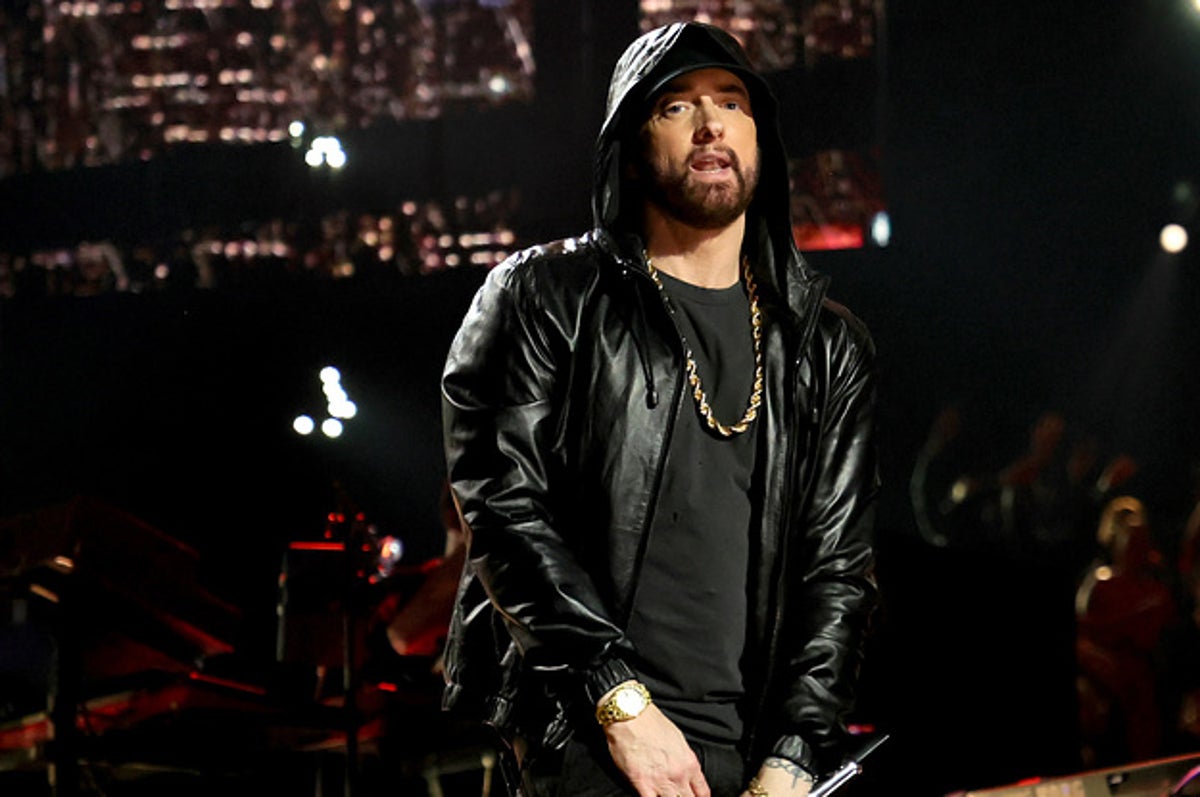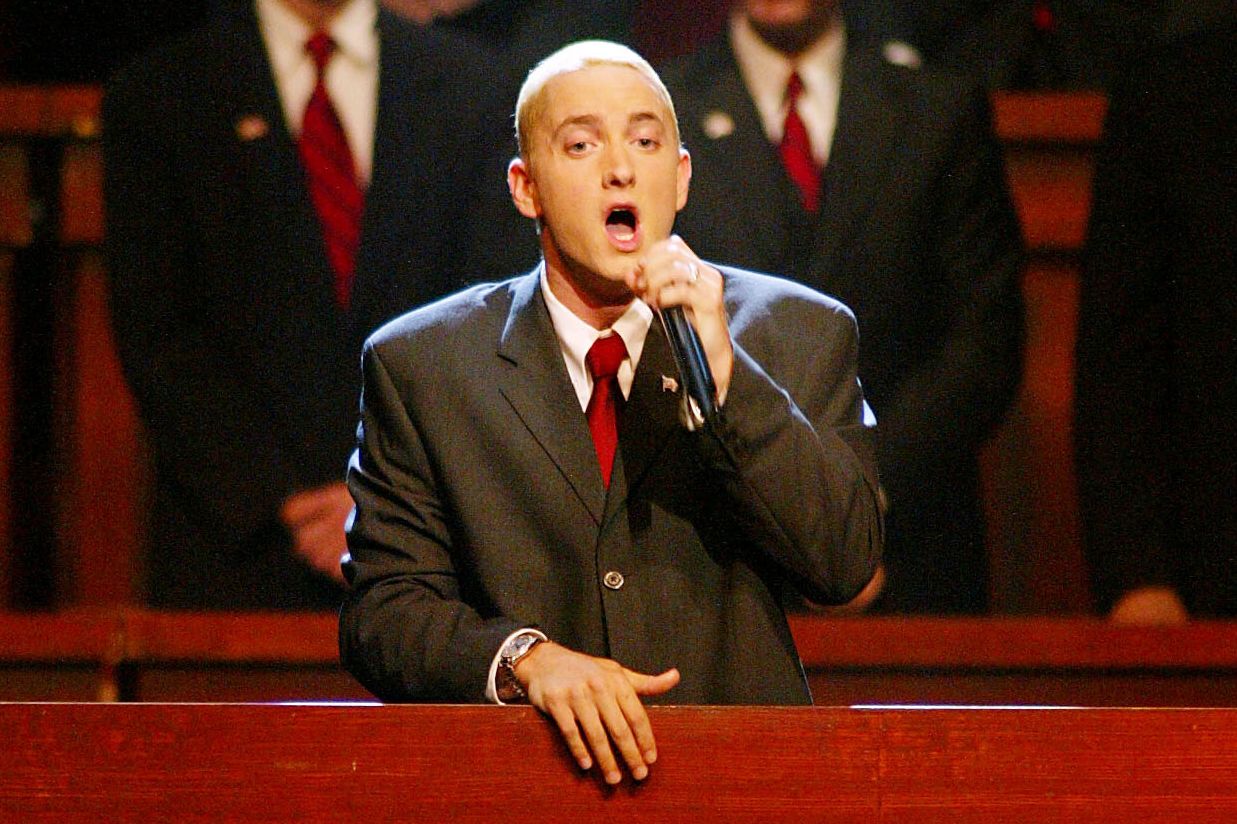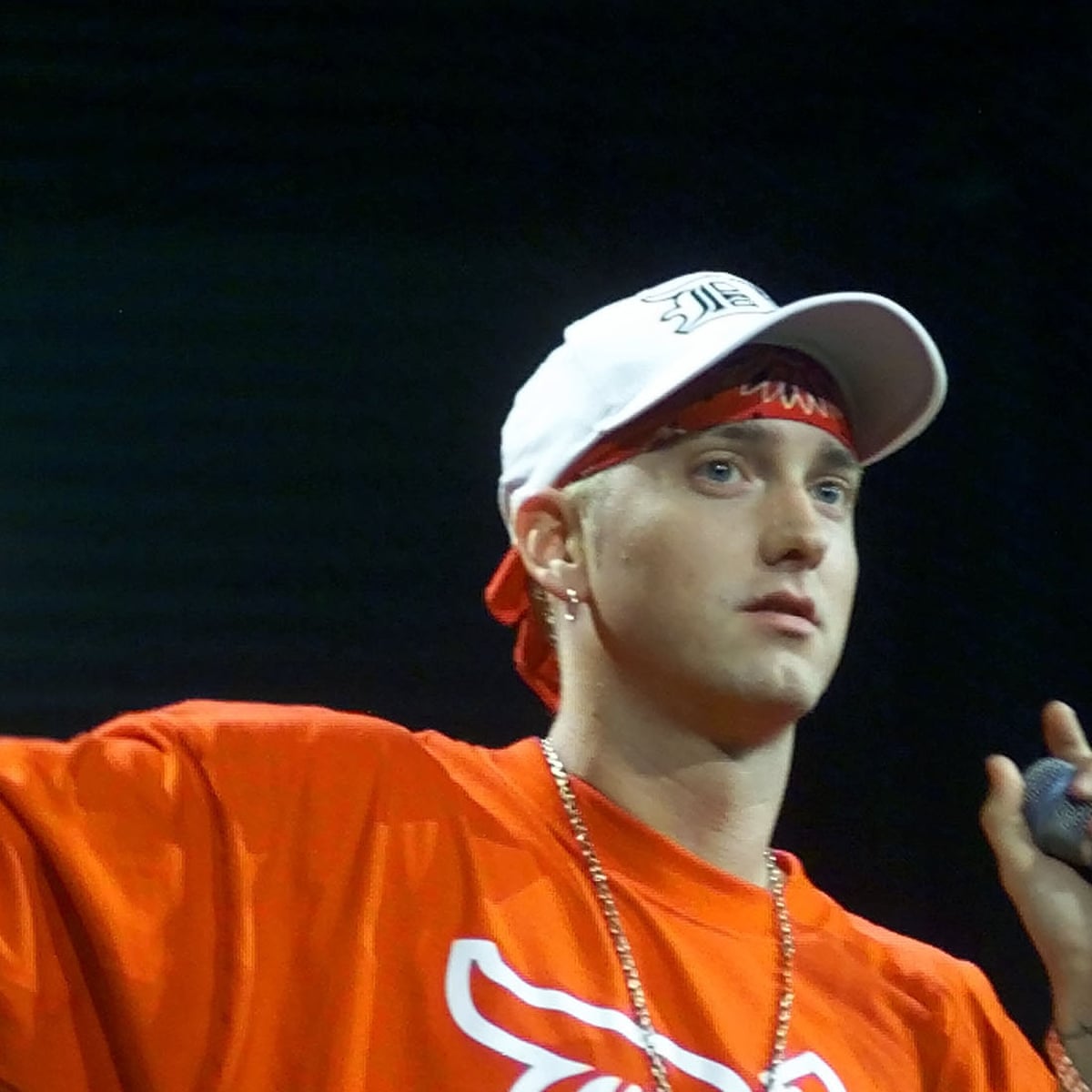‘Revival,’ the rapper’s latest album, is full of anti-Trump posturing, but Eminem’s early career provocations emboldened the same resentful young men whose semi-ironic trolling helped elect the president
There’s a new Eminem album out now. It’s called Revival. We’ll get to it momentarily. First, go back and listen to “White America” from The Eminem Show, the album that prefigured Revival 15 years in advance; the album that warned us that Eminem would become a thudding, stilted hitmaker indefinitely, and, more importantly, that his political descendants would become a white mob of hostile, disaffected weirdos who would take all of their favorite rapper’s “ironic” provocations and turn them deadly serious, even if Eminem was only kidding.

Released in 2002, “White America” was Eminem’s open letter to “so many motherfucking people who feel like me,” who “share the same views and the same exact beliefs,” those convictions including free expression, the right to offend, and a general skepticism of politicians. Following a brief, throat-clearing skit, “White America” opens The Eminem Show, a diamond-certified album that marked a white rapper’s transformation from underdog provocateur into an arena-sized deity who straddles rap, rock, and pop aesthetics all at once. Even before The Eminem Show, so much of Eminem’s music gestured at populist anti-politics and post-partisan rebellion, but “White America” was the Detroit rapper’s first, big, coherent articulation of a political “anger” that he’d previously aimed “in no particular direction.” It’s the language of a political awakening. “I never would have dreamed in a million years, I’d see / So many motherfucking people who feel like me,” Eminem raps.

Fifteen years after the release of The Eminem Show and “White America,” U.S. politics is overrun with right-wing, Eminem-looking motherfuckers. The alt-right is a loose, amorphous movement defined largely by young, white men for whom trolling is art, recreation, and ideology altogether; young, white men whose greatest societal contribution is shitposting. These reactionary trolls would abhor Eminem’s anti-GOP politics, and they would never profess to love any bit of black culture as much as Eminem loves hip-hop. But, otherwise, the imageboard Nazis are all somewhat indebted to Eminem; their neo-shock jock, anti-PC razzing is a language they learned, eagerly or unwittingly, from Eminem. Meanwhile, Eminem has moved on from the hypermasculine provocations that established his infamy in the late ’90s; now he’s spoiling for a fight with President Donald Trump as he overhauls his own, trollish, post–South Park ideology to be trans-inclusive. (I’d say Eminem has grown, but public personae aren’t people, they’re personae; they don’t grow, they adapt.) So the alt-right trolls sound like those old Eminem records, as Eminem now sounds rather unlike himself.
Eminem’s new album, Revival—out last Friday—is the most pop-minded album that he has released since Recovery, and its presidential vendetta against Trump recalls the anti-Bush posturing that inspired peak-Eminem songs such as “White America” and “Mosh.” On his later projects—Hell: The Sequel (with Bad Meets Evil), The Marshall Mathers LP 2—Eminem made great, laborious displays of technical wizardry and dexterity that I’m sure hardcore Eminem fans enjoy, but these hookless, breathless lyrical trials mostly seem to exist for Eminem’s own gratification. Listening to those recent Eminem albums can feel a bit like watching someone diligently rehearse their entry into the Guinness Book of World Records. Mercifully, Revival is somewhat relaxed on that front, as pop and politics take priority. “Tragic Endings”— featuring midbrow, middle-aged hip-hop’s favorite utility singer, Skylar Grey—is the angsty sort of rap-rock ballad that has afforded Eminem commercial immortality even as his core rap principles fall hopelessly out of fashion. “River,” featuring the recently feature-happy Ed Sheeran, adds some faux-country twang to Em’s crossover mix. “Like Home,” yet another rah-rah pop theme, opens with gentle piano, telegraphing a harmless vibe, but then Eminem quickly turns the song into a full-on Trump roast, a patriotic call to arms “where terrorism and heroism meets.” Yes, the song is a presidential death threat featuring Alicia Keys. The record’s gravest offense isn’t treason, but rather its repeatedly taunting of Trump with juvenile insults that serve only to underscore Trump’s general invincibility against critique.

It’s a bit tough for me to discern whether Eminem is baiting Trump from a real sense of urgency, or simply because he reads push notifications like the rest of us and knows an easy entry into the news cycle when he sees one. In October, Eminem launched his album rollout by performing a BET freestyle dis aimed at Trump. Unofficially titled “The Storm,” the freestyle was the first, I’ll wager, that most people had heard about Eminem’s opposition to Trump, though he also dissed Trump during the 2016 presidential campaign with a song called “Campaign Speech.” “The Storm” is a rough but captivating watch: a confident feat of political critique, but a stilted and rusty bit of rapping from a white guy who moves and dresses very much so like a rapper of yesteryear. It is unclear where Eminem fits, and where he thinks he fits, in the so-called discourse. His feud with Trump has been awkward and pointless. For one, this feud has been pretty one-sided. Trump will tweet insults about damn near anyone, and yet he hasn’t bothered responding to Eminem. “I feel like he’s not paying attention to me,” the Detroit rapper told Shade 45 five weeks after his BET freestyle went viral. “I was kind of waiting for him to say something, and for some reason, he didn’t say anything.” It is as if Eminem and Trump are both fluent in the same art of attention-begging, and, for once in his life, Trump knows better than to humor a flagging, desperate troll.
Eminem’s opposition to Trump isn’t the only one-sided dialogue on Revival. Throughout, Eminem forces himself into conversation with contemporary genre trends—trap beats, Migos flows, and “wokeness”—only to find that virtually no one attuned to those trends, including the trend-makers, seem to care about Eminem’s posturing for or against them. Alas, Eminem is stateless. He lives in self-imposed exile, and so he seems to have forged his post-Trump politics in a stifling pop quarantine. Between album cycles, Eminem hides from the press, and so there’s no core maturity narrative, no political redemption arc to guide listeners toward a good reason to take Eminem’s post-Trump politics seriously. Eighteen years ago, Eminem said he ripped Hillary Clinton’s tonsils out and force-fed her sherbet. I know Ice Cube and the rest of N.W.A used to issue similar insults, but their insults followed from a coherent critique of white supremacy, and Cube had to do a couple of decades’ worth of family comedies and PG-rated interviews before non-black, non-hip-hop media would humor his pro-black politics in the mainstream. Gradually, Ice Cube adapted before our very eyes. But Eminem hibernates in private. So when he reemerges in December 2017 with a grudge against Trump for attempting to ban transgender recruits from enlisting in the military—a conviction that doesn’t naturally follow from all we know about Eminem prior to this—it won’t strike most listeners as some thrilling culmination of some desperately needed redemption arc. It just sounds abrupt, unsolicited, awkward, and offbeat. It sounds like so many clueless white rapper parodies that Eminem once put to shame.

In the late 1990s, Eminem established himself as the most provocative rapper since Ice Cube. But Eminem’s provocations were so popular with white listeners that mainstream media was happy to air them—as interviews, as music videos, as edgy millennial brandcraft. In November 2004, George W. Bush had won reelection, and MTV aired a one-hour special, The Shady National Convention, which spoofed the pomp and nonsense of the major party conventions. Naturally, The Shady National Convention nominated Eminem, the titular Slim Shady, for president of the United States. In a vapid and boisterous address, Eminem is introduced by none other than Donald Trump—the real Donald Trump, no imitation. Trump, the so-called Chairman of the Joint Chiefs of Cash, hails Eminem as “a winner.” That’s it; that’s the extent of his bit. Eminem then delivers brief remarks about perpetual hardship, hope, and himself. It’s a silly bit of Bulworth-lite parody that clearly wasn’t written for posterity, having now aged so poorly that I can’t decide whether it’s more or less amusing in retrospect compared with when it first aired. As satire, the whole thing is a joke that spirals inconclusively to the tune of thoughtless applause. There was no real, meaningful point to The Shady National Convention. Eminem and Trump mock the frivolity and pretensions of real politicians, but they also seem to celebrate their own ignorance. The Shady National Convention was stoner comedy. “The Storm” and Revival are stone-cold, sober critiques that Eminem is unsuited to advance.
The problem with adopting that sort of cynicism, as especially as early in life as Eminem did, is that once you’re ready to repudiate it, it’s already gone and betrayed you. Suddenly, your country’s overrun with Nazis, and your costar has become their new role model. It’s too late. The bully won. Apathy prevailed. White America abided.





